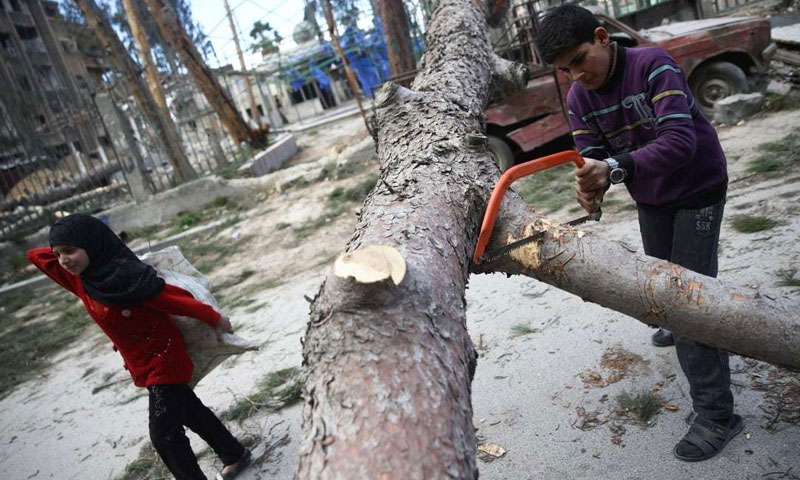



With the prices of fuel being on the rise and the difficulty of getting them in the first place, the residents of Ghouta are basically using firewood for heating.
This reliance on firewood did not start this year, as it began with Ghouta’s besiegement by the regime’s forces in 2013, during which wood became the basic material for heating, cooking and bathing.
Besides the massive damage caused by logging to trees and agricultural wealth in the area, the leftovers of military munition hide in the trees’ branches and trunks, exploding every now and then and jeopardizing the lives of farmers and citizens seeking these trees to use the wood for heating.
The trees’ trunks and branches are transforming into mobile explosive devices while neither the place nor the timing of their explosion is known.
Enab Baladi monitored several incidents in Eastern Ghouta, where the remnants of explosive bullets, stuck in the trees’ trunks and branches, detonated.
Mrs. Salma, a 45-year-old housewife in the city of Kafr Batna, narrated the details of one of these incidents.
Salma, along with her daughter, were injured a few minutes after putting an amount of firewood into the stove at home, an explosion took place, reportedly of unexploded projectiles stuck in the branches she bought.
Salam added that she had to undergo surgery to remove the shrapnel which spread in her body.
Citizens have been repeatedly filing complaints as to rid of the remnants of the cluster munition spreading in the agricultural lands in eastern and south-eastern Ghouta in the farms of the al-Marj, Otaya, al-Ashari and others.
Enab Baladi has also monitored several complaints filed by farmers from the al-Malihah town in the southern sector of Ghouta, reporting the presence of remnants of napalm incendiary weapons which ruined the soil.
Early in December 2018, five children died in the explosion of a landmine in the agricultural village of the Jarba in the al-Nashabiyah district, eastern Ghouta. Two other children died and two were injured in the explosion of a landmine, as reported by the Syrian Arab News Agency/SANA.
The Russian forces and patrols are working on the removal of the mines spreading in eastern Ghouta, which have been planted in the area during the war. Since their control over the area, under a settlement deal, signed between them and the opposition factions in April and March, a year ago, the forces, every now and then, announce discovering mines planted by “militants” in the agricultural and residential areas.
The Russian News Agency TASS quoted Mayass Mahmoud Issa, head of the Engineering Unit in charge of mine removal in rural Damascus, as saying that his unit has been working on the removal of mines and war remnants, parts of which they have destroyed.
In mid-December 2018, Issa stated that his unit has found 50% of the mines and the explosive munition planted in “residential and commercial buildings” in eastern Ghouta during the war.
Issa did not set a time frame to declare the area as free of mines and war remnants, saying that several of the area’s houses are severely destroyed; accordingly, it is hard to define what time the mine removal operations would take.
It is not only mines that are concerning the people of Ghouta, as much as the heating means do, for their prices are soaring in sync to the increasing rates of unemployment and the deterioration of the citizen’s power of purchase throughout Syria.
In addition to this, Ghouta’s people dependence on logging this year and in former years cost eastern Ghouta a part of its agricultural and tree wealth.
Early this year, Rural Damascus Agriculture Directorate said that it has rehabilitated about 23 thousand dunams of agricultural lands in rural Damascus, more than the half are in eastern Ghouta.
Compared to 2016, demand for firewood increased by 40% in 2017, according to the local Tishreen newspaper, while there are not any official statistics about 2018 and 2019.
The residents of eastern Ghouta are yet impotent, faced by life’s difficulties, their daily needs and the effects of war, the risks of which are there’s to address alone in the future.
if you think the article contain wrong information or you have additional details Send Correction